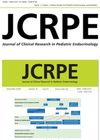 9 citations,
August 2000 in “Journal of Periodontal Research”
9 citations,
August 2000 in “Journal of Periodontal Research” Finasteride reduces testosterone conversion, progesterone lessens this, and levamisole enhances finasteride's effect.
 26 citations,
September 2012 in “Epilepsy & Behavior”
26 citations,
September 2012 in “Epilepsy & Behavior” Finasteride worsens seizures in epilepsy rats and speeds up epileptogenesis in mice.
 1 citations,
March 2012 in “Journal of Dermatological Science”
1 citations,
March 2012 in “Journal of Dermatological Science” Testosterone, progesterone, and levonorgestrel change enzyme levels related to fat production in hamster skin, which could affect skin oil and acne.
 3 citations,
January 2016 in “Elsevier eBooks”
3 citations,
January 2016 in “Elsevier eBooks” Steroid hormones are crucial for body functions and have various medical uses, but their misuse can lead to dependence.
 17 citations,
February 2014 in “The International Journal of Neuropsychopharmacology”
17 citations,
February 2014 in “The International Journal of Neuropsychopharmacology”  April 2023 in “Tikrit Journal of Pharmaceutical Sciences”
April 2023 in “Tikrit Journal of Pharmaceutical Sciences” Deferasirox effectively reduces iron overload in ß-thalassemia patients but may cause some manageable side effects.
 65 citations,
January 2011 in “Frontiers in Endocrinology”
65 citations,
January 2011 in “Frontiers in Endocrinology” Neurosteroids show promise for treating epilepsy and more research is needed.
 24 citations,
September 2001 in “Journal of The American Academy of Dermatology”
24 citations,
September 2001 in “Journal of The American Academy of Dermatology” Women's ovarian hormones and adrenal androgens change throughout life, affecting hair loss and health.
 15 citations,
January 2002 in “Gynecological endocrinology”
15 citations,
January 2002 in “Gynecological endocrinology” Hormones affect skin aging and fat distribution, and treatments can help, but only minoxidil is proven for female hair loss.
 January 2019 in “Springer eBooks”
January 2019 in “Springer eBooks” Acne can appear or persist in adulthood due to hormonal changes, external factors, or substance use, and requires appropriate treatment.
 May 2024 in “Brain disorders”
May 2024 in “Brain disorders” Agmatine may help reduce seizures linked to hormone changes in female rats.
 19 citations,
June 1999 in “Steroids”
19 citations,
June 1999 in “Steroids” Different halogens on progesterone derivatives can either block or mimic male hormone effects, depending on their type and amount.
76 citations,
October 2016 in “Clinics in dermatology” Sex hormones, especially androgens, play a key role in causing acne.
 December 2024 in “Journal of Clinical Research in Pediatric Endocrinology”
December 2024 in “Journal of Clinical Research in Pediatric Endocrinology” 21-hydroxylase deficiency causes hormone imbalances leading to various symptoms, and diagnosis involves clinical and genetic tests.
 123 citations,
December 2015 in “Journal of Neuroendocrinology”
123 citations,
December 2015 in “Journal of Neuroendocrinology” New targets for making and using brain-synthesized steroids could lead to better treatments for brain disorders and alcoholism.
 September 2023 in “Biology of reproduction”
September 2023 in “Biology of reproduction” New testosterone analogs show promise for male contraception with better activity and potentially fewer side effects.
 11 citations,
February 2016 in “Current Medicinal Chemistry”
11 citations,
February 2016 in “Current Medicinal Chemistry” New treatments for prostate cancer and BPH show promise, including novel compounds that target hormone synthesis and response.
7 citations,
May 2017 in “Behavioural brain research” Changing neuroactive steroid levels early in life can affect how adult rats respond to alcohol's stimulating effects.
 14 citations,
March 2017 in “Brain research”
14 citations,
March 2017 in “Brain research” Progesterone and its byproducts control a specific receptor in the brain independently of progesterone receptors, affecting conditions related to the menstrual cycle.
 20 citations,
March 2005 in “Current Medicinal Chemistry”
20 citations,
March 2005 in “Current Medicinal Chemistry” New compounds show promise for treating hair loss, enlarged prostate, and prostate cancer, with some being more effective and having different side effects than current treatments.
 35 citations,
November 2019 in “Frontiers in Neuroendocrinology”
35 citations,
November 2019 in “Frontiers in Neuroendocrinology” Men and women have different levels and production of brain steroids, which may affect their risk for certain brain disorders.
 18 citations,
March 2020 in “Frontiers in Neuroendocrinology”
18 citations,
March 2020 in “Frontiers in Neuroendocrinology” The enzymes 5α-reductase and 3α/β-hydroxysteroid oxidoreductase help create brain-active substances from progesterone and testosterone, which could be used for treatment, but more research is needed to ensure their safety and effectiveness.
 25 citations,
June 2017 in “Scientific reports”
25 citations,
June 2017 in “Scientific reports” Stress worsens Tourette symptoms by increasing allopregnanolone levels.
 59 citations,
November 2018 in “Psychoneuroendocrinology”
59 citations,
November 2018 in “Psychoneuroendocrinology” Lower levels of certain brain chemicals are linked to worse PTSD symptoms in men.
 5 citations,
October 2020 in “Brain Research Bulletin”
5 citations,
October 2020 in “Brain Research Bulletin” Etifoxine, an anxiety drug, can lessen brain inflammation and cognitive issues in mice, partly by increasing production of protective brain steroids.
Cyproterone acetate is an effective treatment for women with acne, hair loss, and excessive hair growth.
 131 citations,
September 2017 in “Molecular and Cellular Endocrinology”
131 citations,
September 2017 in “Molecular and Cellular Endocrinology” The document concludes that blocking the internal pathways that create androgens might help treat cancers that depend on sex hormones.
 80 citations,
January 1988 in “The Journal of clinical endocrinology and metabolism/Journal of clinical endocrinology & metabolism”
80 citations,
January 1988 in “The Journal of clinical endocrinology and metabolism/Journal of clinical endocrinology & metabolism” Spironolactone can cause side effects like irregular bleeding, but lower doses may reduce these effects and still improve hirsutism.
 36 citations,
June 2001 in “Neuroscience Letters”
36 citations,
June 2001 in “Neuroscience Letters” Finasteride may affect fetal brain development and increase arousal, but more research is needed for safety confirmation.
 August 2015 in “Evidence Based Women Health Journal (Online)”
August 2015 in “Evidence Based Women Health Journal (Online)” Inositol was more effective than Metformin in treating symptoms of PCOS in women.


























